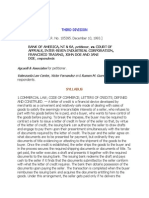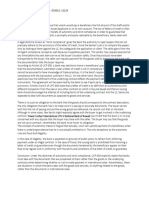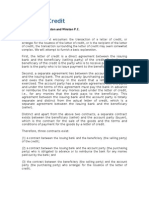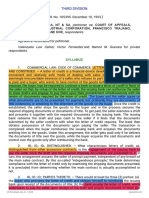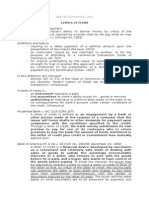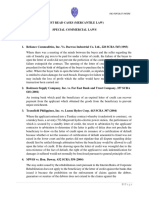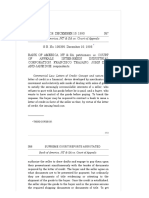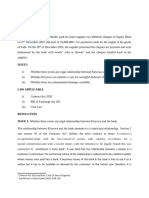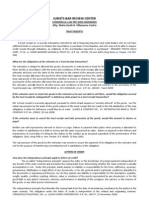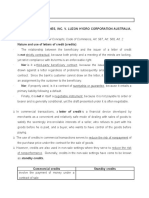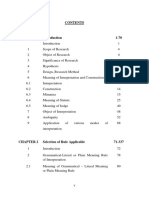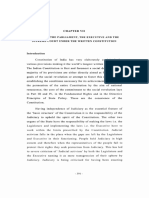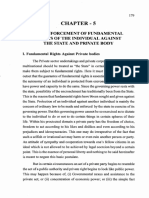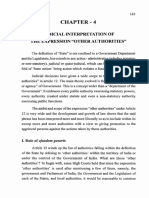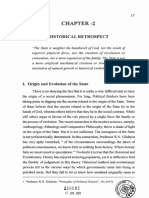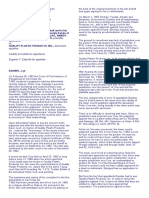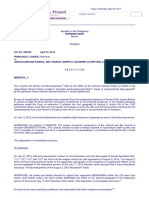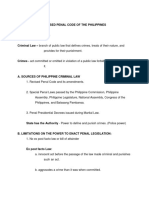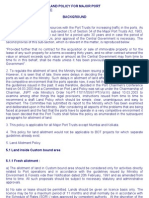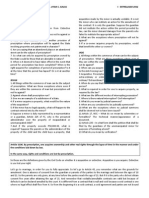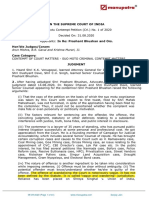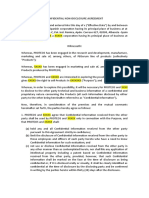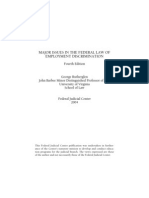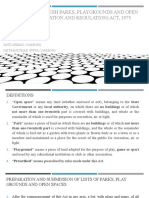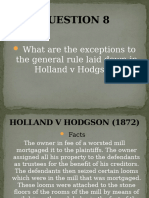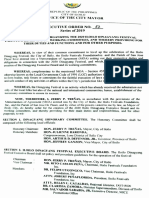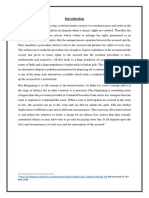0 ratings0% found this document useful (0 votes)
79 views11 - Chapter 7
11 - Chapter 7
Uploaded by
Vinay Kumar Kumar1. The document discusses bank guarantees and injunctions related to letters of credit. It focuses on situations where injunctions may be granted to prevent payment under a letter of credit, specifically in cases of fraud.
2. The general rule is that a bank's obligation under a letter of credit is independent of any disputes between the buyer and seller. However, courts will make an exception and grant an injunction in cases where the seller is proven to be acting fraudulently, such as shipping worthless goods instead of what was agreed upon.
3. One case example discussed is Sztejn v. Henry Schroder Banking Corporation, where the plaintiff alleged the seller shipped cow hair and rubbish instead of the agreed upon
Copyright:
© All Rights Reserved
Available Formats
Download as PDF, TXT or read online from Scribd
11 - Chapter 7
11 - Chapter 7
Uploaded by
Vinay Kumar Kumar0 ratings0% found this document useful (0 votes)
79 views50 pages1. The document discusses bank guarantees and injunctions related to letters of credit. It focuses on situations where injunctions may be granted to prevent payment under a letter of credit, specifically in cases of fraud.
2. The general rule is that a bank's obligation under a letter of credit is independent of any disputes between the buyer and seller. However, courts will make an exception and grant an injunction in cases where the seller is proven to be acting fraudulently, such as shipping worthless goods instead of what was agreed upon.
3. One case example discussed is Sztejn v. Henry Schroder Banking Corporation, where the plaintiff alleged the seller shipped cow hair and rubbish instead of the agreed upon
Original Title
11_chapter 7
Copyright
© © All Rights Reserved
Available Formats
PDF, TXT or read online from Scribd
Share this document
Did you find this document useful?
Is this content inappropriate?
1. The document discusses bank guarantees and injunctions related to letters of credit. It focuses on situations where injunctions may be granted to prevent payment under a letter of credit, specifically in cases of fraud.
2. The general rule is that a bank's obligation under a letter of credit is independent of any disputes between the buyer and seller. However, courts will make an exception and grant an injunction in cases where the seller is proven to be acting fraudulently, such as shipping worthless goods instead of what was agreed upon.
3. One case example discussed is Sztejn v. Henry Schroder Banking Corporation, where the plaintiff alleged the seller shipped cow hair and rubbish instead of the agreed upon
Copyright:
© All Rights Reserved
Available Formats
Download as PDF, TXT or read online from Scribd
Download as pdf or txt
0 ratings0% found this document useful (0 votes)
79 views50 pages11 - Chapter 7
11 - Chapter 7
Uploaded by
Vinay Kumar Kumar1. The document discusses bank guarantees and injunctions related to letters of credit. It focuses on situations where injunctions may be granted to prevent payment under a letter of credit, specifically in cases of fraud.
2. The general rule is that a bank's obligation under a letter of credit is independent of any disputes between the buyer and seller. However, courts will make an exception and grant an injunction in cases where the seller is proven to be acting fraudulently, such as shipping worthless goods instead of what was agreed upon.
3. One case example discussed is Sztejn v. Henry Schroder Banking Corporation, where the plaintiff alleged the seller shipped cow hair and rubbish instead of the agreed upon
Copyright:
© All Rights Reserved
Available Formats
Download as PDF, TXT or read online from Scribd
Download as pdf or txt
You are on page 1of 50
293
CHAPTER - VII
BANK QUARAMTBES AMP INJUNCTIONS
The function of the Civil Law ia not only
to lay down or define the rights of the parties but
to provide for and grant relief when a person is
prevented from realizing or enjoying his rights or
when the right has been infringed or in other words,
when the corresponding duty is not being fulfilled
or has been violated. The highest form of protection
which may be expected from or should be aimed by the
state is to see that no one encroaches upon or inter-
cepts the rights of another. Palling that, the aim
of the Law should be to give a suitor the very thing
or nearly equivalent or similar to it as possible
which is being or has been deprived.
An injunction is a discretionary r^nedy, and
for the grant of an injunction we have to refer to the
provisions of the specific Belief Act and the Code of
Civil Procedxire, This means that the Courts in India
have to deal with Injunction not only as an equitable
relief but as a relief founded on the basis of law
which embodies the principles of injunction.
294
Lretters of credit are now coming Into wide
spread use as an effective commercial device. More
small manufactures and business are engaging in
international trade« necessitating their use.
Letters of credit are also becoming more common in
domestic trade. Most important* however* is the
dramatic development of performance guarantee/ bank
guarantee used in both domestic and international
transactions to guarantee the performance of such
contractual promises as construction of roads,
sewers* or buildings* malntainaDce of Sophisticated
communication* manufacturing* or other facilities
in foreign countries. The spread of credit into
nonsale areas* moreover* has just begun. The only
limits on their use are the creative abilities of
those who use them. In short* performance guarantees
are being used in more ways* in more business tran-
sactions* than ever before. The telling proof of
the broadenced Interest in letter of credit law is
dramatic Increase in the number of reported cases.
In the great bulk of these cases the critical Issue
has been under what circiunstances may an Injunction
issue restraining a bank from making payment on its
letter of credit. In other words two questions are
important in this regard. Firstly* is there any
29J
situation in which the bank is under a duty to
refuse payment when requested to do so by the
customer? Secondly, if so, when will an injunction
lie that orders the seller not to draw under the
credit or the issuing banker not to accept or pay?
Corresponding to cases in which buyers try
to take advantage of minor deviations known in
banking parlance as technicalities, beneficiaries
occassionally engage in fraudulent practices such
as falsification of bills of lading or other docu->
ments of title. When this comes to the attention
of the customer or the issuing bank, a thorney legal
problem is in the making.
The Courts will only interfere to grant an
injunction against the beneficiary of the credit pre-
venting him from receiving payment under the credit
Af a sufficiently grave reason could be shown, namely
forgery or fraud by the beneficiary or by some one
for whom he is responsible.
Fraud will be inferred In circumstances when
the goods shipped by the beneficiary are of a totally
different nature from thos contracted for and the
contract of sale ^s specified in the contract of
29J
credit, or the godds shipped contain rubbish. In
cases of fraud the court will not c^npel the
Issuing or confirming banH to honour the credit
because the beneficiary deliberately acts wrongfully
in seeking to avail himself of the credit when the
Icnows that he ( or a person for whOTi his respcMMliale)
has shipped goods which are not those called for by
the terms of the credit*
In accordance with customary law, the bank's
duty to verify and subsequently to accept or pay is
Independent of failure of consideration in the
underlying agreement. The issuing banker is, there-
fore, in an unconfortable position, he knows that
the acceptance or the payment he is going to make,
although warranted by the law because the documents
appear on their face to be genuine, will possibly
cause a loss to his custcxner, especially if the
transaction is an international one. If a seller is
willing to risk the consecjuences of a criminal action
on fraud, it is quite likely that his assets are
either virtually non exlstant or so well hidden that
an action in restitution by the distant purchasers
would result in nothing but an expensive academic
29;
victory for the pucchaser. The banker could became
'technical* himself and pick some deviation, however,
slight, in order to avoid payment, but, if there is
compliance on the face of the documents the bank
would be hard put to make such a claim, especially
if the drafts and documents were presented by an
intermediary negotiating bank.
Since the development of Modern letters of
credit law in the nineteenth century, courts have
uniformly held, as a general rule, the issu^ obli-
gation under the letter of credit is independent of
any defence the customer may have against payment on
the underlying contract. To this rule there is a
recognised exception. This exception provides that
the Courts will give relief if it is established that
the seller is acting fraudulently in the transaction.
In Edward Owen Engineering Ltd. v, Barclays Bank
International Ltd, Brown L,J, stated the exception
as follows I
"The exception is that where the
docviments under the credit are
presented by the beneficiary himself
and the bank knows when the documents
are presented that they are forged
or fraudulent, the bank is entitled
to refuse payment".
290
Under the Anglo-American Law, the customer
should be entitled to the Injunctive relief only
when he could show irreparable damage, for example,
if he had deposited cash with the issuing bank and
the bank was in danger of insolvency, but that.
where the credit was issued merely against the promise
of the buyer to indemnify the bank, the former can
in no way control the discretion of the bank in
paying out its funds under the credit. In sztejn v«
2
Henry Schsoder Banking Corporation, the plaintiff
in New York contracted to purchase a quantity of
bristles from a supplier in India* Payment under
the contract was to be effected by an irrevocable
letter of credit. The letter of credit provides
that the drafts by the beneficiary for a specified
portion of the siile price would be paid by the defendant
bank upon shipment of the merchandise and presenta-
tion of an invoice and bill of lading made out to
the order of the bank. The letter of credit was
delivered to the beneficiary by a correspondent of
the issuing bank in India. Both the bills of lading
and the invoices described the material shipped
exactly as required in the credit as bristles.
29^
The plaintiff alleged that the beneficiary
had filled the fifty crates with cow hair and other
worthless material and rubbish, with the intend of
simulating the merchandise and defrauding the plain-
tiff then alleged that the beneficiary had drawn a
draft under the letter of credit to the order of the
correspondent bank in olndia for collection. The
correspondent bank presented the draft and dociiments
to the issuing bank for payment. The plaintiff there-
upon brought an action seeldng that the letter of
credit be declared void, and asking for an injunction
to prevent of the drafts. Justice Shientag observed!
" I t would be a most unfortunate inter-
ference with business transactions
if a bank before honouring drafts
drawn upon it was obliged or even
allowed to go behind the doctiments,
at the request of the buyer, and
enter into controversies between
buyers and the seller regarding the
quality of the merchandise shipped.
If the buyer and the seller intended
the bank to do this they could have
so provided in the letter of credit
itself, and in the absence of such
a provision the court will not
demand or even pennit the bank to
delay drafts which are proper in
form". But he further said}
"this is not a controversy between
the buyer and seller concerning a
mere breach of warranty regarding
the quality of the merchandise.
OJ
On the present motion, it must
be assumed that the seller has
Intentionally failed to ship
any goods ordered by the buyer.
In such a situation,where the
seller*s £raud has been called
to the bank's attention before
the drafts and documents have
been presented for payments» the
principle of independence of the
banks' obligation under the letter
of credit should not be extended
to protect the unsczupulous seller
It is true that even though the
documents ojr forged or fraudulent,
if the issueing bank has already
paid the draft before receiving
notice of the seller's fraud, i£
will be piayteeded if it exercised
reasonable diligence before
making such payment.
The restraint which was granted, in
SJZTezn's case is subject to two impori:ant qualifi-
cations. First^ that the bank which was collecting
the draft was s^erely acting as the agent of the seller.
This point is significant because if the drafts had
been negotiated to a third party, the court would
have not restrained payrant. Secondly, the case
proceeded on the basis that fraud has been established.
The difficulty which most buyers face in practice
is establishing that fraud had taken place, Vfhen
the buyer is merely alleging that the seller has been
fraudulent* as opposed to actually establishing fraud.
30
the courts are normally cjulte reluctant to interfere.
Equally, if the drafts drawn under the credit had
been negotiated to the holder in due course, the
courts again will not interfere with the payment
Both these facts were taken into account by Megarry
3
J, in Discount Redards v» Barclays Bank, when he
dismissed the buyer's application to stop the issuing
and confirming bank from making payment under the
letter of credit. In this case, the plaintiff, an
English company, ordered from a French Canpany, 8,625
gramophone records and 825 oassetters. A confirmed
irrevocable letter of credit was opened by the buyers
through the defendant bank. When the goods were
delivered, the plaintiffs found that only 275 records
were as oi!"dered and that 75% of the cassetters
delivered vfere not as ordered. The Inspection of
the goods was done in the presence of a representative
of the bank. The plaintiffs instructed the Bank not
to pay on the ground that the seller had acted fraude-
lently. Counsel referred to Sztejn's case for the
proposition that where the seller's fraud has been
called to the bank's attention before the drafts and
documents have been presented for payment, the
3o:
principle of the Independence of the bank's obliga-
tion under the letter of credit aught not to be
extended to protect the unscrupulous seller* In
dismissing the application, Megarray J, distinguished
Szte^n's case on two grounds. First, that Satejn's
case was dealing with established fraud and secondly
in that there was an absence of any possible holder
4
in due course. He saidt
" In the present case, there is,
of course, no established fraud,
but merely an allegation of
fraud, I do not say that the
doctrine of that case is wrong
or that it is incapable of exten-
sion to cases in which fraud is
alleged but has not been established,
provided a sufficient cause is
made out".
Adding the usual caution against undue inter-
ference with the bank's payment obligations,
5
Megarry J, saidg
" 1 wouflid be slow to interfere
with bank*s irrevocable cre-
dits, and Hot least in the
spare of international banking,
unless a sufficiently grave
cause is shown, for intejrventions
by the Court that are too ready
or too frequent might gravely
impair the relliance which, quite
properly, is placed on such
credits".
30.
The difficulty of establishing actual fraud
has been one of the causes which has prevented the
plaintiff from getting an injunction. In United city
Merchants ( investments) Ltd, v* Boyal Bank of Canada,
the House of Lords further decided that a plea of
fraud will only apply If the person applying for
payment is a pazrty to the fraud. The plaintiff in
this case agreed to sell to peruvian buyers equipment
for a glass fibre making plant, Paj^ent was to be by
way of a letter of credit. The contract of sale
provided that shipment was to be made on or before
December 15, 1976, The goods were loaded on boardship
at Flen±4towe on Deceotiber 15, but the loading agents
issued a set of bills of lading on December 15, stating
that the goods were"received for payment". The defen-
dant bank objected to the bills of lading on the ground
that they were not on board bills of lading. The
carriers freight brokers then issued a fresh set of
bills of lading stating that the goods were loaded on
board ship at London on December 15, The bank again
refused to pay, this time on the ground that they had
information which suggests that shipment had not been
made on the date stated in the bills of lading. In an
action by the plaintiffs against the bank, the bank
304
conteiided they were under no obligation to pay i£
the documenta presented although conforming on
their face with the credit, nevertheless contain
seme statements of material facts which were not
accurate. This contention was rejected by the House
of Lords on the ground that to accede to it would
undermine the whole system of financing international
trade by means of documentary credits. Lord Diplock
saidt
•• The exception for fraud on the
part of the beneficiary seeking
to avail himself of the credit
is a clear application of the
maxim exturpi causa non orifxxr
actio or, if plain English is to
be preferred, fraud unravels all".
The Courts will not allow their
process to be used by a dishonest
person to carry out the fraud. The
instant case ,however, does npt
fall within the fraud exception".
In spite of the fact that the Courts have
expressly acknowledged the existence of the fraud
exception, they have, however, shown extreme reluc-
tance to apply the rule lest any damage be done to
the confidence in this system of payment. As in
the case of Bolivinter Oil S,A, V . Chase Manhattan
7
Bank, the court granted an injunction against the
30o
beneficiary of the credit of/performance bond but
left the bank free to honour their obligations if
they chose to do so* The plaintiff's in this case
were freight contractors who entered into an agre«nent
with Homs, an Iranian Company to carry 238 million
tons of Iranian cnide Oil to Syria, The plaintiffs'
gave Hone a performance bond for US fi million payable
at your first request without any other producers
whatever from your side". There was some delay in
the performance of this contract and Homes made a
claim on the plaintiff. The parties entered into
second freight agreement and it was agreed that the
performance guarantee would be released upon the
arrival ofthe cost vessel carrying oil to Syria, The
plaintiffs agreed to provide Homes with a letter of
credit for US^ 4,3 million to cover their disputes.
In spite of the argument Homes made a claim under
the performance guarantee. The plaintiffs obtained
injunctions against Homes# the issuing bank and the
confirming bank« the commercial bank of Syria from
paying out on the performance guarantee, Staughton j.
diacharged the injunctions against the issuing and
confirming bank in a subsequent hearing and the
30 J
plaintiff*a appealed againat this deciaion. The
plaintiffs contended that the injunction was sought
to prevent the beneficiary from profiting from his
own fraud. The court of Appeal decided that this
was not a case of established fraud*
It is clear from the above decisions that
courts maintain a great and fundamentally important
separation between the rights of the peurties under
the underlying contract and the rights of one of them
under the independent banking contract.
Whether fraud has been established in any
given case is a question of fact and closely related
to this is the question of the burden of proof that
lies on the plaintiff before a case of fraud is made
out. The issue was considered by the court of Appeal
g
in United Trading Corporation v. Allied Arab Bank.
The plaintiffs in this case contracted to supply
Agromark, a state enterprise in Iraq* with eggs,
chicken* lamb and beef, A total of 19 contracts*
worth some US ^ 950 million were involved. The plain-
tiffs provided the buyers with a performance guarantee
of 10% of the total value of the contract. The
3o;
guarantee payable unconditionally against any claim
for damages was given hy Rafidian BanX in Iraq on
behalf of the plaintiffs. The buyers made a claim
under the performance bond and the plaintiffs sought
an injunction against the issuing and the confirming
bank to restrain th«m from paying under the guarantee.
The plaintiffs contended that the buyers were acting
fraudulently in that the claims related to contracts
which had been satisfactorily perfoinmed many years
before. The court of Appeal was of the view that
the plaintiffs have established a seriously arguable
case that fraud Y^ad occiired but on the balance of
convenience, they would not grant the injunction,
9
Ackner L.J. said. The evidence of fraud must be
clear, both as to the fact of fraud and as to banlcs
knowledge. The mere assertion or allegation of fraud
would not be sufficient. The Courts require strong
corroborative evidence of the allegation, usually in
the form of contemporary documents, particularly
those emanating from the buyer. In general, for
evidence of fraud to be clear, courts would also expect
the buyer to have been given an apportunity to answer
the allegation and to have failed to provide any, or
30J
any adequate euiswer in circumstanoes where one could
properly be esqpected* where the Courts consider on
the material before it the only realistic inference
is that of a fraud* Then the seller would have made
out a sufficient case of fraud.
Commenting on the reluctance of the courts to
10
apply the exception in practice, AcJcner L,J« observed!
"Moreover we would find it an unsatis-
factory position if, having established
an important exception to what had
previously been thought an absolute
rule, the courts in practice were to
adopt so restrictive approach to the
evidence reguired as to prevent them-
selves fran intervening were this
to be the case, in pressive and high
sounding phrases such as fraud unravels
all".
It is well recognised that letter of credit lore
their economic viability if they are constantly subject
to delay or uncertainty. Letters of credit work well
only if payment under theOR . is pranpt and inevitable
when the beneficiary's documents are in order. C«nmer-
cial law has always recognised the high cost of fraud,
however, and some courts are justifeably concerned
that the credit not become a device for perpetrating
fraud. In cases of fraud, courts have been willing to
resort to their ecjuity powers to delay payment of the
30o
credit unfortunately, courts are not in a position
to know whether an account party's claim of fraud
is valid« and sometimes are properly reluctant to
entertain the fraud defence of an issuer or of an
account party seeking to enjoin honour of the credit.
The fraud inquiry entails considerable investigation
and time, if courts delay honour of credit until
the parties have litigated the fraud issue, the
credit will not survive as an efficient cannmercial
device and will not achieve some of its significant
commercial functions. Although there is a split of
authority on the scope of ffaud question, even those
courts that given the fraud defence broad scope
acknowledge that the costs of doing so are high.
Section 5-111(1) of the Uniform Commercial
Code imposes on the beneficiary of a letter of credit
a warranty obligation. The statute provides that
the beneficiary transfer or presentation of a docu-
mentary drafts or demand for payment warrants to all
interested parties that the necessary conditions of
the credit have been complied with.
First, the existence of warranty often gives
the complaining account party an adequate remedy at
310
law and should deprive him or her of the Equitable
relief so Often sought at great expense to the letter
of credit transaction. Second, the warranty gives
independent significance to the beneficiary's certi*
ficate common in perforraance guarantee transactions
and thereby over-comes the impliaation that the
purpose of the certificate is to give the account
party/beneficiary a fraud defence to a claim for
payment under the credit. Third, the warranty relieves
the account party from sometimes burden some proof
problems in his or her action for damages against
beneficiary that has obtained payment under the credit
with documents that contain latent defects.
In performance guarantees, the credit commonly
requires the beneficiary to certify - - ^i_ that
the account party has failed to perform his or her
executary permission. This is also known as a
certificate of inspection. A certificate of inspection
is a document which is issued by some one designated
euMl by both parties, or by a third party that is
asked to inspect the goods prior to shipment or at
the moment of shipment, or whatever is the nature
of credit. It may be a construction of something,it
may be, now-a-days drilling equipment or whatever, a
certificate of inspection is a documents then which
31
says, " I have inspected that which is to be
inspected under the credit. I hereby render an
opinion that this is in accordance with that was
12
stipulated to be the goods or service to be performed" ,
The requirement of other documents, and particularly
certificates of analysis, quality, weight and the like,
is a reasonable precaution for a prudent buyer to take,
since he may in this way obtain some measure of
assurance that the merchandise is as ordered. Courts
unaware of the beneficiary's warranty may be inclined
to see these certificates as a protection against the
beneficiary's fraud, under this view the account party
has insisted on the certificate in order to have a
fraud defence should the beneficiary present a false
certificate. This view beccmies all the more compelling
when the certificate referes to the underlying contract
by reciting for example, that a sum is due under a
contract or a lease. In these cases, the courts are
wont to say that the certificate incorporates the under-
lying contract and opens the letter of credit litiga-
tion to the resolution of underlying contract disputes,
that is, whether the sxun is in fact due. It is impor-
tant to recognise that the certificate plays an important
role in the transaction without serving as a vehicle for
312
entering the underlying dispute in the credit
transaction. It is true that the warranty forces
the court to look beneath the face of documents but
the warranty inquiry occures after the credit is paid
and does not interfere with the proper functioning
of the credit,
Cotirts can achieve two desirable results by
giving full rein to warranty provisions. First, they
can enhance the remedies for a defrauded account party.
Second, they can reduce the number of orders restraining
issuing bank from paying credits. This first result
puts fraud costs on beneficiaries withoat damaging
the credit. The second protects the credit device
from the impredictable costs and delays that equitable
interference inevitably imposes on credits in general
By reducing these costs and delays, courts will enhance
13
•to the benefit of all industries that use them,
A ccMiunercial letter of credit is independent
of the underlying sales contract between the customer
and the beneficiary. The issuers responsibility:K >to
honour a draft drawn under the credit is not affected
by the sellers* breach of warranty concerning the
quality or the conditions of goods involved. Thus in
the usual course the issuer must honour the draft for
313
payment that complies with the terms of the relevant
credit, regardless of whether the goods or dociiments
conform to the underlying contract. However, where
the documents or the underlying transaction are
tainted with the beneficiary's intentional fraud the
issuer need not honour the draft even though the
documents comply on their face, A proper definition
of fraud will necessarily encompass and be limited
by the recjuirement of scienter, that there be an affir-
mative, knowing misrepresentation of fact or that
the beneficiary state a fact not having any idea
about its truth or falsity, and in reckless disregard
of truth.
The stand-by letter of credit is useful in
such transactions precisely because it allows the
parties to shift the risk of unjustified demand from
the beneficiary to the custaner. This legitimate
purpose can best be served by a narrow definition of
fraud in the transaction. A strict definition of
fraud in the transaction would ultimately made the
standby letters of credit more valuable v/here it is
appropriate and thus preserve its usefulness in commer-
cial transactions.14
J14
Such a Btand«rd would not destroy the
coinmercial utility of letters of credit because it
serves no commercial purpose to provide certainty of
payment to one who has intentionally deceived other
parties to a transaction. Nor would such a standard
make injunctions readily available. Not merely
fraud be pleaded with particularity, but also the
four traditional factors Justifying a preliminary
injunction must be considered, First the probability
that the plaintiff will eventually succeed on the
merits; second, the presence of irreparable injury
to the plaintiff; third, the injury to the defendant
if the injxinction is granted; and, finally, the
interest of the public or third parties.
It is clear that the fraud exception is now
firmly recognised by the English Courts, in spite of
this recognition one seases an extreme reluctance by
the courts to apply it in practice for fear that irre-
porable damage would be done to the system of payment
that has grown up with the letter of credit. The
Courts have strived to maintain confidence in this
system of payment at the expense of a few individuals
who have entered into inexpedient contracts and this
is by no means a bad thing.
31J
The letter ot credit to-day Is an extremely
useful and viable financing device« both In the
sale of goods transaction
traditional/and In the more recent performance guarantee.
In the future the letter of credit will become
Increasingly Important In both International and
domestic earamercial and business transactions. As
the letter of credit grows in popularity the principles
of law applied to th«n- must be more fully elaborated
if their efficacy is to be maintained, in case of
letter of credit of international trade requires presen-
tation of documents prepared independently of the
beneficiary. In the case of performance guarantee
the documents called for is usually the beneficiary's
own certificate that the other party to the underlying
transaction is in default there under an open initiation
to abuse by the unscrupulous beneficiary. In any events
instances of fraud involving performance guarantee
appears ^ to be much ra«er than theoretical fears
could indicate. Loss of reputation in the interna-
tional community is a severe and immediate sanction
awaiting a dishonest beneficiary.
Indian poaltlon
Vfhether a bank guarantee has become enfor-
ceable or not wiil depend on its terms and the
language of the letter of demand. In other words.
In case of bank guarantee or a letter of credit
the enforceability of such an instrument against
the bank depends on the terms and conditions of the
same. In practice, the questions that most frequently
arise relate to the guarantor's liability. The
guaranteeing bank is liable for non-performance of
the underlying contract. This much is elementary
and flows from the very nature of the contract. But
in practice there arises questions of enforcement.
Is the guaranteeing bank entitled to defnahd proof
of non-performance, or is it bound to comply with
the guarantee as soon as it is called upon to do so 7
If the former is the case, then there can possibily
arise disputes as to non-performance. This is likely
to drag in the conflict between the Principal and
the beneficiary in the correspondence between the
guarantor and the beneficiary. On the other hand,
if the beneficiary and the bankioat to avAid such
three dimensional controversy, the guarantee can
either be made absolute and unconditional or at least
JIV
some acceptable mechanism for concrete proof of non-
performance may be laid down in the contract of
guarantee.
The same principles of Law which have been
adhered to and accepted by the courts in England and
the United States have been adopted and adhered to
by the courts in India as well. In Ten Maco Ltd, v,
16
State Bank of India and others^ it was held that the
bank must pay according to its guarantee, on demand, if
so stipulated, without proof or conditions. The only
exception is when there is a clear fraud of which
the *tbank has notice. The facts of the case wh«=»re that
at the request of the Pet|:tdkoner company the respondent
bank had given an irrevocable and unconditional
performance guarantee in favour of the State Trading
Corporation of India Ltd, ( S,T,C, ) which provided
interalia that in the event of the company's failure
to fulfil their contractual obligations the bank shall
pay to S,T,C, on its first demand the guarantee amount
without any contestation, demur or pro-test and/or
without amy reference to the ccmipany and /or without
questioning the legal relationship subsisting between
S,T,C, and Texrmaco, The guarantee was later invoked
by the S,T,C, and asked the bank for full payment.
313
the petitioner company there upon filed a suit.
A question, therefore« arose whether the Textnaco
was entitled to the Injunction as asked for, res-
training the bank from making any payment to the
S,T»C, In pursuance of the performance guarantee.
The Court said that In the absence of any
special equities and the absence of any clear fraud,
the bank must pay on demand, if so stipulated and
whether the terms are such must have to be found out
from the performance guarantee as such* Though the
guarantee was given for the performance by Te^^aco
In an orderly manner their contractual obligation was
taken by the bank to repay the amount on first demand
and without contestation, demur or protest as without
reference to Te^^aco and without question the legal
relationship subsisting between S.T.c. and Termaco.
The performance guarantee fxorther provided that the
decision of S.T.C. as to the liability of the bank
under the guarantee shall be final and binding on the
bank. It has further stipulated that the bank should
forthwith pay the amount due " notwithstanding any
dispute between S.T.C. and Texmaco." In that context
the moment a demand is without protest and contestation
the bank is obliged to payirrespectlve of any dlsjmte
as to whether there has been performance In an
31J
orderly maaner of the contractual obligation by
the party. There was no question here of any fraud or
equity entitling Tcamaco to an injunction.
Another case on the subject is National Oils
and Chemical Industrie3« Delhi v, Punjab and Said Bank
n
Ltd.J Delhi. In this case it was contended that a
confijnmed letter of credit constitutes a bargain between
the banker and the vendor of the Qoods^ which imposes
on the bank an absolute obligation to pay irrespective
of any dispute which there may be between the parties
and it would be wrong for the courts to interfere with
that established practice by granting and in confirming
the injunction, because an eleborate coramercial system
has been built upon on the footing that the bankerts
confirmed credit raises an rassurance that nothing
will prevent the vendor from receiving the price, that
the character-istlc feature of the irrevocable credit
own
is its/independence of the contract for sale and of
contract between the banker and the buyer and that ano-
^^®^ important feature is the duty of strict compliance
being a mechanism of great* importance in international
trade, interference with which is bound to have serious
32
repercussions on the international trade in the
country and that the letter of credit being the life
blood of international commerce and except possibly
in clear cases of fraud of which the banks have notice,
the courts ought to leave the merchants to settle
their disputes under the Contract by litigation and
arbitration available them as stipulated in the
contracts, the courts being not concerned with the
difficulties of the merchants to enforce their claims
because these are the risks which the merchants take*
In case there are serious allegations of fraud
on prima facie examination of the said allegations in
the light of the averments of the parties, the matter
cannot be allowed to rest at that and deserves to be
fully probed and determined. In such a case the
principle of Independence of bank's obligation under
the letter of credit is not to be extended to protect
the unscrupulous seller.
Pesticides India v, S«C^ and p. Corporation
of India, raised the question of performance guarantees
by banks, particularly in the light of the absolute
nature of liability: of the principal debtor on whose
behalf the guarantee was given. In the instant case
J2'^
the £act8 were*
W« the Statui Bank o£ Bikaner and Jaipur,
Udalpur bind ourselves xincondltlonally and Irrevocably
guarantee and undertake that in the event of any
default/ failure on the part of the Actual user/ Allottee
to observe all or any of the conditions prescribed/
to be prescribed by you. We shall on your first
demand without protest or demur and without reference
to the Actual user/Allottee and notwithstanding any
contestation by actual user/Allottee or existence of
any dispute whatsoever between you and the Actual user/
Allottee pay forth with to you that you may deanand.
It was held that the bank was bound to pay on
the first demand without any contestation by the
Pesticides India, the principal debtor. Thus according
to the Court the unqualified terms of the guaranttee
could not be interfered with by the courts, irrespec-
tive of the existence of the dispute.
The above has been supported bv the Supreme
Court in Centeen (India) Ltd. v. Vlnmor/lnc. The point
before the Suprane Couri; was whether in view of its
earlier decision in United Cooanercial Bank v. Bank of
20
India* it could interfere to grant Injunction for th
Enforcement of the bank gueurantee. The sellers, a
322
Singapore oonoern, agreed to sell high density
polythene to the buyer^ em Indian Company^ Canteix
(India) Ltd. on the basis of an irrevocable letter
of credit in favour of the former. The buyer complied
with the condition. The seller failed to forward,
through bank, the original bills of lading, marine
insurance policy, signed invoices etc, to enable the
buyer to take the delivery of goods. The buyer
secured bank guarantees In favour of the shipping
Company, where-after the latter released the goods
to the buyer without furnishing to it the above
documents. The buyer receive the goods, sold them
and realised the sale proceeds* But no amount was
paid to the seller. The buyer brought a suit for res-
training the bank from paying the money on the alleged
ground of inferiols quality of goods. The Supreme Court
held that the balance of convenience was that the
injunction should not be granted. Affirming the deci-
sion of the High Court the Supreme Court held that
commitments of banks must be allowed to be honoured
free from interference by the courts, otherwise, trust
in international ccxnmerce would be irreparably damaged.
The courts usually r«frain from granting
injunction to restrain the performance of the contractual
liZ.
obligations arising out o£ a letter o£ cjredlt or
bank guarantee between ane bank and another. If
temporary Injunctloas were to be granted In a tran-
saction between a bank and a banker, restraining a
bank fvon recalling the amoiint due when payment Ip
made under reserve to another bank or In terms of
the letter of credit executed by lt« the whole banking
system In the country would fall. In view of the
Banker's obligation under an Irrevocable letter of
credit his buyer customer cannot Instruct him not to
In the following cases the enforcement of bank
guarantee as a qpilck mode of recovery of sums due under
the printed terms of the contract has been considered
and the law Is almost settled.
In National Project Constinictlon Corporation
22
Ltd. V. M/s G. Ranjan^ the bank guaranteed the recovery
of the sumof te, 3,50«000 by the petitioner,corporation.
The bank guarantee provided If the said contractor faljs
to utilise the said advance for the purpose of contract
we the Bank of Baroda, hereby unconditionally and Irre-
vocably undertake to pay the corporation on demand and
without demur and any claim made by the corporation on
:i2
us for the loss or damage caused to or suffered by
reason of the corporation not being able to recover
In full the said sunt*
The trial court Issued an Injunction res-
training the corporation from enforcement of the bank
guarantee. The Calcutta High Court allowed the
revision application and set aside the order of
injunction. The Court cited with approval the deci-
sion of the Supreme Court in MSEB Bombay v» Official
23
Liquidator^ The Cotxrt held thusi
** The petitioner is entitled to fall
back upon the bank guarantee when
the balance sum had not been paid
petitioner's right to realize that
balance is not dependent upon adjudica-
tion of the dispute to arbitration*
To this extent^ the bank guarantee
can very well be enforced on its own terms,"
The law is thus settled that extraneous claims
and counter claims do not injunct the enforcement
of the bank guarantee. The enforcement depends upon
its terms and conditions.
In a recent case D»T»H, Construction (P) Ltd,, v,
24
Steel Authority of India,,# the Calcutta High
Court refused to issue an injunction restraining the
:idJ
enforcement of bank guarantee. The contract In the
Inatant case was for dredging and deepening a reservlor
and the plaintiff received from the defendant No«l
Rs, 30 lakhs for bringing machinery for the work, A
survey revealed that the reservoir could neither be
dredged nor deepened because of the brlck« railway
tracks and rocks under neath. The judge did not accept
the Contention of the bank that under section 56 the
guarantee was rendered void an account of Impossibility
of performance. The Judge observed:
Even If the main contract between
the plaintiff and defendant No.l
was entered Into by the plaintiff
on account of lackof knowledge of
certain facts by the defendant No,l
or even because of misrepresentation
made by defendant No, 1, the bank co\ild
have no say In the matter. This Is
now %rell established by several
decisions of this ootirt as well as
the Supreme Coxirt and of the English
Courts, 25
The decision correctly follows the judicial
preeedctata and Is grounded on the theory that the
contract between bank and defendant No,l was Independent
26
of the Contract between the plaintiff an6 defendant No,l
Again, In United CCTtimerclal Bank v, Hanuman~
27
Synthetlces Ltd,, the latter agreed to buy from a
323
Singapore concern specified quantity of vis core
staple fibre. The purchasers opened an irrevocable
letter of aredit at the Central Bank of India in favour
of the seller. The United Commercial Bank Singapore,
paid the amount ag2Li.n8t the documents for the goods
shipped and forwarded them to Central Bank of India,
Bombay* The united Commercial Bank refunded the amount
on arrival, the customs authorities declared that the
imported stuff was not vis core but polyester fibre.
The purchasers asked its bank to repudiate its liability
and sought a perpetual injunction against it from
making any payment or giving credit to the seller an^er
the irrevocable letter of credit. The Court held that
except possibly in clear caMe of fraud of which the
banks have notice, the courts will leave the merchants
to settle their disputes under the contracts by liti-
gation or arbitration as available to them or stipulated
in the contract.
If the bank guarantees are unconditional the
bank has no defence when its guarantee is sought to be
enforced. It iai :th« document of guarantee that has to be
scanned to ascertain whether the guarantee is conditional
or otherwise and whether it is an autonomous contract by
itself. Only in case of a clear fraud of which the
327
bank haa notice and where the special equity was
in favour of the beneficiary - the courts may grant
an injunction restraining enforcement of bank
28
guarantee*
Recently Sabyasachi Mukharji and Jagannatha
Shetty, JJ, of Supreme Court have considered the
various Supreme Court and High Courts cases in U»P.
Co«>operative Federation Ltd, v» Singh Consultants and
29
Bngineers (P) Ltd, The Court heldi
The principles upon which bank guarantees
could be invoked or restrained are well settled, only
in exceptional circumstances would the courts interfere
with the machinery of irrevocable obligations assured
by the banks. In the case of a confined performance
guarantee^ Just as in the case of a confined letter of
credit, the bank is only concerned to ensure that the
terms of its mandate and confizitnation had been complied
with and is in no way concerned with any contractual
disputes which might have arisen between the parties.
Therefore the commitments of banks must be honoured
free from interference by the courts, otherwise trust
in commerce* internal and international, would be irre-
porably damaged. It is only in exceptional cases of
32J
fraud or in cases of irretrievable injustice to be
done* the courts should interfere.
The facts of the instant case were that the
appellant, a State Government enterprise, on May 17,
1983 entarttd into a contract, a private limited
company for the supply and installation of a vanaspati
manufacturing plant at Hardeecharu in the District
of Nainital. The contract bond contemplated guaranteed
performance of work at various stages in accordance
with schedule prescribed therein and provided for
completion and commissioning of the plant after due
trial run by the May 15, 1984,
Two bank guarantees were executed by the
Bank of India, Ghaziabad, and the bank guarantee
provided, inter alia as followsi
Now, therefore, the Bank hereby guarantees
to make unconditional payments of Rs, 16,5 lacs to the
Federation on demand at its office at Lucknow without
any further question or reference to the on the seller's
failure to fulfil the terms of the sale on the following
terms and conditionsi
(A) The sole judge for deciding whether the seller
has failed to fulfil the terms of the sale, shall be
the PCB.
a2j
(B) This guarantee ahull be valid upto twelve
months from the date of is8ue«i,e« upto June 24,1984«
(C) Claims, if any, must reach the bank in
writing on or before expiry date of this guarantee
after which the bank will no longer be liable to make
payment to PCF.
(D) Bank's liability under this guarantee
deed is limited to 16,5 lacs ( Rupees sixteen lacs
fifty thousand only )«
(£} This guarantee shall not be revoked by the
bank in any case before the expiry of its date without
written permission of the Federation,
And whereas to secure the said advance, the
seller requested the bank to fxirnish a Bank guarantee
of the said amount of Rs. 33 lacs ( Rupees thirty three
lacs) in favour of the PCF and the bank accepted the
said request and agreed to issue the required bank
guarantee in favour of the Federation,
Now, therefore, in consideration of the
aforesaid advance of the said sum of Rs, 33 lacs (Rupees
thirty three iacs) to be paid by the PCF to the seller
as aforesaid the bank hereby agrees and guarantees to
make unconditionally immediate payment to the Federation
at its office at Lucknow of the sum or any part thereof.
33d
as the case may be, due to PCF from the seller
at any time on receipt of the notice of demand
without any question or reference to the PCF or to
the seller on the seller's failure to fulfil the
terms of the said advance.
In the instant case, injunction was sought
against the bank and not against the respondents, it
was held by the Supreme Court that the net effect of
injunction was to restrain the Bank from performing
bank guarantee. That could not be done.one cannot
indirectly do what one is not free to do directly.
But a mal ~ treated man in such circumstances is not
remedyless. The respondent was not to suffer any
injustice which was irretrievable» The respondent
could sue the appellant for damages. This is not a
case where an injunction can be granted. Irrevocable
ccxnmitment either in the form of confirmed bank
guarantee or irrevocable letter of credit cannot be
interfered with except in the case of question of
apprehension of irjretrievable injustice , This is a
well settled principle of law in England, This is
also a well settled principle of law in India,
33x
Each case has to be examined In the light
of the followingI
(1) Whether demands for enforcing the bank
guarantees has been made strictly In accordance
with the terms of the document concerned; or
(2) Whether there is any allegation of fraud
against the beneficiary of which the bank has
notice; or
(3) Whether there is any special equity arising
out of the peurticular situation of the case giving
rise to a strong prima facie arguable case against
enforcement of the bank guarantee or not. This test
was applied in f^/s Banerjee and Banerjee v, Hindustan
Steel Works Construction Ltd, in the instant case
the bank guarantees were g]bren pursuant to the express
terms of the contract entered into between the peti-
tioner, a principal debtor and the respondent No.l,
a beneficiary, a company for constjruction of works in
the Super power Thermal project. Out of the seven
bank guarantees, two were in lieu of security deposit
and five were for securing mobilisation advance by
the respondent No.l to the petitioner under the terms
of guarantees^ for enforcement of the guarantees the
respondent No,l had to make a written demand stating
33^
that the petitioner has coramitteed breach of any
terms of the contract and the extent and the
quantum of JLOSS or damage suffered or to be suffered
by the respondent No.l as a result thereof. The
decision of the respondent No«l regarding the quantum
of damage was not to be questioned or challanged by
the banks or fulfilment of these tvro conditions, the
bank was bound to release the guaranteed amount.
However the respondent No.l while seeking the enforce-
ment of the bank guarantees failed to discharge its
duty as the sole Judge to quantify the damages and
to mention the extent of recoveries made by it although
it was within its special knowledge. Although a
large amount was recovered by the respondent No.l
there was no whisper about the same in the demand
letters.
It was held that by suppressing the material
fact from the bank the respondent No, 1 attempted to
recover the entire sum under the seven guarantees and
the suppression of such material fact in the demand
letters have given rise to a special equity in favour
of the petitioner to stop payment by the bank on the
basis of these demand letters. Although in the
33o
petition, there was no allegation of fraud, the
said wilful flase representation by the beneficiary
that the entire guaranteed amount has become due and
payable by suppressing the facts of recoveries
already made, was a factor, which must be treated
on the same footing as fraud giving rise to a
special equity and must be treated as an exception
to the general rule that the court should not Inter-
fere In these matters.
Similarly in Jute .^^ corporation of India v#
-31
M/s Konark Jute Ltd,, the principal had given two
bank guarantees to the purchasing agent. The principal
sought to restrain the purchasing agent of Jute from
enforcing the bank guarantee and restrain the banks
from making payment thereof. The Court found that
the balance of convenience was in favour of the
principal. It was held that in the peculiar circum-
stances of the case, the receipt of the money on bank
guarantee would ruin of the principal which cannot be
repaired. The balance of convenience in such a situa-
tion would be in favour of the principal.
The Court also wanted to protect the business
of the agent so that the ends of Justice were not
defeated. It, therefore, held that this could be best
,} d -i
done in case the principal securiBd the commercial
rate of interest on the amount on both the bank
guarantees £or six months to the satisfaction of
the trial court.
In M,S,J,R» Enterprises v« M/s State Trading
32
Corpn, of India Ltd,, the bank guarantee provided
that the bank hereby unconditionally and irrevocably
guarantee that if the Agents fall to perform any of
th^i^obligatlons contained in the contract dated
10,9.1982 including any amendments or modifications
to the aforesaid contract dated 10,9,1982 made between
the Agents and STC, The bank shall pay forthwith to
the STC such amount or amounts as the bank may be called
upon to pay subject to the mauclmum of Rs, 10 lakhs pro-
vided -that the guarantee herein furnished shall be
released and discharged after the expiry of 30 days
from the day of the shipment of the I'ost lot of goods,
in respect of the export contracts between the STC and
the foreign buyers.
It has been held that since prima facie the
guarantee stood discharged and although no element of
fraud existed yet the guarantee having been Invoked
after it had prima facie esqpired. It was a fit case
d:i
that during the pendency of the suit the injunc^on
was granted restraining the corporation frcxn realising
the amount o£ the bank guarantee.
Although the courts are not concerned with
the underlying contract on the basis of which the
bank guarantee have been given. Yet the situation
may arise where the underlying contract was not
concluded one. In such a case the cjuestion is v Can
there be enforcement of the bank guarantee or not?
The Bombay High Court in Kirtoskar Pneumatic Co,Ltd»v,
N,T»P, Corpn. Ltd, it was held that there was no
contract between the parties to keep to bid alive
that the bid could be revoked before the acceptance
or the appellant have done, that the respondents did
not act to their detriment relying on the bid of the
appellants, the bid guarantee c o u M only be invoked
if the contract were to be awarded to the appellant•s
and they had failed to pay the amount or to perform
their part which stage never arose. The respondents
could not invoke the bid guarantee in terms of the
contract and hence a clear prima facie case exists,
where in an injunction can be issued whereby the bank
is restrained by making the payment. The court
ri *
J3
further held that the balance of convenience also
Is clearly in favour of the appellants because even
are
if the above findings/ found to be wrong all that
would happen is that at the end of the litigation Appea-
lants would be able to recover the amount of the
bid guarantee or such other sum as may be determined
by the Court, It is nobody's case that the appellant's
are not solvent to the extent of bid guarantee and
hence all the conditions of Issuance of temporary
injunction are satisfied.
In M/s Synthetic Foams Ltd. v, aimplex C»P«
34
(India) Pvt, Ltd», the facts were that the completion
of the contract by the plaintiff has been withheld
not due to any default of the plaintiff but due to
the intervening fire which has taken place at the site.
There is nothing to suggest that the plaintiff has
committed any default in the performance of the contract
or any breach of the terms of the order, where as the
peirusal of letter filed by the plaintiffs shows that
the guarantee was sought to be invoked by the defendant
No, 1 on the ground that the plaintiff have not fulfilled
the obligation contained in the terms and the conditions
of the order, which is misrepresentation of facts.
secondly, the contract has been cancelled by the
defendant No, 1 due to technical reasons and also
due to Increase in prices rather than due to any
fault of the plaintiff.
The bank guarantee was as follows:
••we, Indian overseas Bank hereby
agree and undertake that if in
your opinion any default is made
by M/s Synthetic Foams Ltd, in
performing any of the terms and/or
conditions of the order or if in
your opinion they commit any breach
of the order or there is any demand
by you against ^^/s Synthetic Foams
Ltd, then on notice to us by you,
we shall on demand and without demur
and without reference to M/s Synthetic
Foams Ltd, immediately pay to you, in
any manner in which you may direct,
the said amount of Rs, 1,00,000/-
(Rupeea one lakh only ) or such portion
thereof as may be demanded by you not
exceeding the said seen and as you may
from time to time require . ••
The courts ?Iown where there are allegations of
misrepresentation or suppression of material facts or
violation of the terms of guarantee, the courts would
not hesitate in granting an injunction. In this content,
misrepresentation or suppression of material facts or
violation of the terms of the guarantee can be treated
as a species of the same genus as fraud. What is
necessary that there exists special equity in favour of
li'S
the pl«dntlff to grant of injunction. No doubt an
obligation of a bank under the bank guarantee is'
absolute^ but such an absolute obligation arises
only if the conditions of the bond are satisfied
and if the demand made on the bank is in strict accord
with its terms and there is no element of fraud,
misrepresentation or suppression of material facts
involved but where there are allegations of fraud,
misrepresentation or suppression of facts made by the
party against the beneficieiry and there is prima facie
evidence to suggest that there is some truth in these
allegations then there would possibly be no absolute
bar against the courts from granting an injunction
restraining the bank fran making payment on the basis
of the bank guarantee* Similetr would be the position
where the dememd made by the beneficiary is in violation
of the conditions of the bond or is not in strict
accord with its terms keeping in view the nature of
obligation of the bank the terms of the bank guarantee
would have to be strictly construed in such cases.
Accordingly in the instant case an injunction was
granted restraining the defendants from enforcing the
bank guarantee.
33-
By enunciating the general principle of non-
interference by the courts in respectof the bank
guarantee and letter of credit^ the courts only
Intended that the International trade and commerce
should function smoothly without interference from
court. At the same time, the courts expected that
the merchants and traders in international trade and
ccwnmerce will honour their respective ccxnmitments
and the business honesty would be maintained. By
the theory of non-interference in cases of letters
of cxredit and bank guarantees, certainly the courts
did not intend that international trade and commerce
should flourish by adopting dishonest unscmpulous
practice. These trade practices and the commitments
by the banks are treated on a different level by the
courts and are allowed to function without interference
frcxn courts only with the view that the trust in inter-
national com/nerce is not damaged in any way and not
for encouraging malafide activities of unscrupulous
traders. If so, fraud or the special equity arising
out of the peculiar situation of the case could not
have been made exceptions to the general principles
of non-interference by courts.
REFERENCES
1. (1978) 1 Q,B. 159
2. (1941) 31 N.Y.S. 2d. 631
3. (1975) ILloyds Rep« 444
4« Ibid*« at p, 447
5, Ibid,,at p. 448
6, (1982) 2 Llyod»s Rep, 1
7, (1984) 1 Llyod's Rep, 251
8, (1985) 2 Llyod's Rep, 854
9, Ibid, at p, 561
10, Id, at p. 56
11, John F, Dolan,letters of credit. Article 5
Warranties, Fraud and the BeneiElclary's certi-
ficate. The Business Lawyer, Vol, 41 No,2
P, 347 1986,
12, Boriskozolchyk. The letter sif credit In courtj
An Export Testifies, Banking Law Journal, 340
13, Supra note 11
14, Mlchhale Stern, The Independence Rule In standby
Letters of Credit, The University of ChlcagoLR
vol, 52, 1985,
15, Nussbei,um« Temporary Restraining Orders and
Preliminary Injunctions, The Federal Practice,
26 S.W,L.J. 265, 273 ( 1972) cited by Edward L,
Symons,JR,, Letters of credit. Fraud, Good-faith
and the Basis for Injunctive Relief, TULANE LAW
R, Vol, 54, 1979, p, 380 (1980)
34
16. A.I.R, 1979 Cal, 44; Indian Cable Co, Ltd, v*
M/s Plastic Products Engineering Co,,A,I,R.
1979 Cal. 370,
17, A,I,R, 1979 Del, 9
18, A,I,R. 1982 Del, 76| A same view has been taken
In M/s B,L,R« Mohan y., P,S, Co-op, S.& M,
Federation,Ltd, A,I,R, 1982 Del, 357| B.S.Aujla
Company Pvt, Ltd, v« Kaluram Mohan Deo Prasad,
A.I.R, 1983 Cal, 106; Banwarl Lai v, Punjab
State Co->op, and s,& M, Federation Ltd,(Dell^l}
A,I,R, 1983 Del, 86
19, A,I,R. 1986 S,C. 1924
20, A«I.R, 1981 S,C« 1426
21, Supra note 19 at 1927
22, A.I.R. 1985 Cal.23
23. A.I.R. 1982 S.C. 1947
24. A.I.R, 1986 Cal, 31
25. Id.« at 38
26. I.e. Saxena, Law of Contract, ASIL Vol. XXII,
P. 98 (1986).
27. A.I.R. 1985 Cal, 96; The Calcutta High Court
noted and approved the decision of the Supreme
Court In Tarapore & Co., Madras v. V.D, Tracta
Export MOSCOW, A.I.R. 1970 S.C. 891, the Court
shduld not freese the amount of the Irrevocable
letter of credit.
34-:
28. A.I.R, 1985 Mad. 213; State v, M/s M.K, Patel
& Co., A.I.R. 1985 Guj. 179
29. (1987) 8 Reports (S.C.) 567;
In M/s G,S. Atwal & Co, (Engineers) Pvt.Ltd,
V. N.P, C. Ltd.. A.I.R, 1988 Del. 243, it kaa
been held that where there is a mere allegation
without any prima facie proof of fraudulent act-
the courts cannot and should not interfere
without bank guarantee by issuing an injunction;
M/s Escorts Limited v. Modern Insulators Ltd.,
A.I.R. 1988 Del. 345.
30. A.I.R. 1986 Cal. 374; Allied Resins & Chemicals
Ltd., V. M&M. Trading Corporation, A.I.R. 1986.
Cal. 346.
31. A.I.R. 1986 Ori. 238| M/s Brul Mxumgan Traders v.
R.C. & F. Ltd., Bombay, A.I.R. 1986 Mad. 161.
32. A.I.R. 1987 Delhi 188
33. A.I.R. 1987 Bom. 308
34. A.I.R. 1988 Del. 207
You might also like
- The 5 Elements of the Highly Effective Debt Collector: How to Become a Top Performing Debt Collector in Less Than 30 Days!!! the Powerful Training System for Developing Efficient, Effective & Top Performing Debt CollectorsFrom EverandThe 5 Elements of the Highly Effective Debt Collector: How to Become a Top Performing Debt Collector in Less Than 30 Days!!! the Powerful Training System for Developing Efficient, Effective & Top Performing Debt CollectorsRating: 5 out of 5 stars5/5 (1)
- Montano vs. Insular GovernmentDocument1 pageMontano vs. Insular GovernmentC.J. EvangelistaNo ratings yet
- NEGO - Letters of Credit - (3) Bank of America v. CA (228 SCRA 357)Document12 pagesNEGO - Letters of Credit - (3) Bank of America v. CA (228 SCRA 357)Choi ChoiNo ratings yet
- Bank of America Vs CA - G.R. No. 105395. December 10, 1993Document8 pagesBank of America Vs CA - G.R. No. 105395. December 10, 1993Ebbe DyNo ratings yet
- Letters of CreditDocument100 pagesLetters of CreditJai Delos Santos100% (3)
- Bank of America, NT & SA, Petitioner, vs. COURT OF Appeals, Inter-Resin Industrial Corporation, Francisco Trajano, John Doe and Jane DOE, RespondentsDocument29 pagesBank of America, NT & SA, Petitioner, vs. COURT OF Appeals, Inter-Resin Industrial Corporation, Francisco Trajano, John Doe and Jane DOE, Respondentseasa^belleNo ratings yet
- International TradeDocument1 pageInternational Tradekeith stevenNo ratings yet
- Feati Vs CA-taxDocument3 pagesFeati Vs CA-taxtiamia_painterNo ratings yet
- Letters of CreditDocument3 pagesLetters of CreditJanine Marmol100% (1)
- Banking Case Notes Corp & Comm Term 3Document32 pagesBanking Case Notes Corp & Comm Term 3Mugabi John BoscoNo ratings yet
- Negotin Commercial LawDocument27 pagesNegotin Commercial LawChristopher Michael OnaNo ratings yet
- Letter of Credit ExplainedDocument6 pagesLetter of Credit ExplainedChux Elumeze0% (1)
- Petitioner Respondents Agcaoili & Associates Valenzuela Law Center, Victor Fernandez Ramon M. GuevaraDocument15 pagesPetitioner Respondents Agcaoili & Associates Valenzuela Law Center, Victor Fernandez Ramon M. GuevaraLiene Lalu Nadonga100% (1)
- Petitioner vs. vs. Respondents Agcaoili & Associates Valenzuela Law Center, Victor Fernandez Ramon M. GuevaraDocument14 pagesPetitioner vs. vs. Respondents Agcaoili & Associates Valenzuela Law Center, Victor Fernandez Ramon M. Guevaraaspiringlawyer1234No ratings yet
- Coverage For 918Document24 pagesCoverage For 918JoyNo ratings yet
- DigestDocument15 pagesDigestdll123No ratings yet
- 1 Transfield Phils., Inc. vs. Luzon Hydro Corp., Et. Al.Document2 pages1 Transfield Phils., Inc. vs. Luzon Hydro Corp., Et. Al.Arthur Archie TiuNo ratings yet
- 2019 Civil and CommercialDocument50 pages2019 Civil and CommercialMay Rosarie Anne LumbreNo ratings yet
- 2019 Pre Week Lecture in MERCANTILE LAW MJRSI 11 15 19 PDFDocument29 pages2019 Pre Week Lecture in MERCANTILE LAW MJRSI 11 15 19 PDFFrankie BacangNo ratings yet
- Merc - Must ReadDocument67 pagesMerc - Must ReadJulchen ReyesNo ratings yet
- Letters of CreditDocument6 pagesLetters of CreditUlrich SantosNo ratings yet
- NOTES From Weekday ClassDocument12 pagesNOTES From Weekday ClassPéddiéGréiéNo ratings yet
- PAPER 2 Paper On Credit TransactionsDocument11 pagesPAPER 2 Paper On Credit TransactionsPouǝllǝ ɐlʎssɐNo ratings yet
- PALS - Bar Ops Corporation Law Must Read CasesDocument70 pagesPALS - Bar Ops Corporation Law Must Read CasesOnat PNo ratings yet
- International Trade LawDocument9 pagesInternational Trade LawOkaka HowardsNo ratings yet
- 2018 Pre Week Lecture in BankingJ SPCL and Negotiable Instruments Law As of November 16 2018Document22 pages2018 Pre Week Lecture in BankingJ SPCL and Negotiable Instruments Law As of November 16 2018Martin MartelNo ratings yet
- Documentary Credit SystemDocument5 pagesDocumentary Credit SystemVivek Pratap SinghNo ratings yet
- UP BOC Commercial Law LMTDocument30 pagesUP BOC Commercial Law LMTJul A.No ratings yet
- Lecture Notes SpeccomDocument7 pagesLecture Notes Speccomjolly faith pariñasNo ratings yet
- Letter of Credit DigestDocument6 pagesLetter of Credit Digestjongreyes100% (1)
- Discussion LCDocument5 pagesDiscussion LCRiona Vince SaliotNo ratings yet
- Merc - Must ReadDocument87 pagesMerc - Must ReadpaulNo ratings yet
- KNJLKM LDocument23 pagesKNJLKM LYrra LimchocNo ratings yet
- Letters of CreditDocument3 pagesLetters of CreditCarlo OroNo ratings yet
- Case DigestDocument4 pagesCase DigestGail FernandezNo ratings yet
- Doctrines of Strict Compliance and AutonDocument11 pagesDoctrines of Strict Compliance and AutonVaibhav GuptaNo ratings yet
- Letters of Credit, TRL and NILDocument11 pagesLetters of Credit, TRL and NILOna DlanorNo ratings yet
- Spec Com Final1Document152 pagesSpec Com Final1Recson BangibangNo ratings yet
- Letters of Credit CasesDocument3 pagesLetters of Credit CasesSam Sy-HenaresNo ratings yet
- BANKINGDocument16 pagesBANKINGFlorentina DiamondNo ratings yet
- AssignmentDocument7 pagesAssignmentDeepanshu ParasharNo ratings yet
- An Act Penalizing The Making or Drawing and Issuance of A Check Without Sufficient Funds or Credit and For Other PurposesDocument69 pagesAn Act Penalizing The Making or Drawing and Issuance of A Check Without Sufficient Funds or Credit and For Other PurposesHermay BanarioNo ratings yet
- Spec Com Final1Document153 pagesSpec Com Final1Paula Bianca EguiaNo ratings yet
- Nego Cases 15-17 (Digested)Document3 pagesNego Cases 15-17 (Digested)Supply ICPONo ratings yet
- Bouncing Checks LawDocument11 pagesBouncing Checks Lawzyphora grace trillanes100% (1)
- HSBC vs. National SteelDocument29 pagesHSBC vs. National SteelAaron CariñoNo ratings yet
- Final Work For BankingDocument14 pagesFinal Work For Bankingrovia2949No ratings yet
- Group 2 BankingDocument22 pagesGroup 2 Bankinggraceatibuni7No ratings yet
- Gempesaw V CADocument3 pagesGempesaw V CAChil BelgiraNo ratings yet
- Letters of Credit and Trust Receipt CasesDocument12 pagesLetters of Credit and Trust Receipt Caseslouis jansen75% (4)
- Lozano vs. MartinezDocument3 pagesLozano vs. MartinezEra GasperNo ratings yet
- Petitioner Respondents L.B. Camins Angara, Abello, Concepcion, Regala & CruzDocument13 pagesPetitioner Respondents L.B. Camins Angara, Abello, Concepcion, Regala & CruzJiro AcuñaNo ratings yet
- 2019 Mercantile Law Reviewer PDFDocument334 pages2019 Mercantile Law Reviewer PDFrobertoii_suarez67% (6)
- Conclusion and Suggestions: Chapte R-9Document24 pagesConclusion and Suggestions: Chapte R-9Hamdan HassinNo ratings yet
- Spec Com (Letters of Credit Cases)Document9 pagesSpec Com (Letters of Credit Cases)Katrina Quinto PetilNo ratings yet
- Batas Pambansa Blg. 22Document7 pagesBatas Pambansa Blg. 22charmssatellNo ratings yet
- BAROPS2010 (Reminders) (1) by Prof. Maria Zarah v. CastroDocument21 pagesBAROPS2010 (Reminders) (1) by Prof. Maria Zarah v. CastroSaintxeNo ratings yet
- Letters of Credit: General Concepts, Code of Commerce, Art. 567, Art. 568, Art. 2Document26 pagesLetters of Credit: General Concepts, Code of Commerce, Art. 567, Art. 568, Art. 2CresteynTeyngNo ratings yet
- Consumer Protection in India: A brief Guide on the Subject along with the Specimen form of a ComplaintFrom EverandConsumer Protection in India: A brief Guide on the Subject along with the Specimen form of a ComplaintNo ratings yet
- 498A IpcDocument26 pages498A IpcVinay Kumar KumarNo ratings yet
- 06 ContentsDocument4 pages06 ContentsVinay Kumar KumarNo ratings yet
- 08 - Chapter 4Document33 pages08 - Chapter 4Vinay Kumar KumarNo ratings yet
- Chapter 4 Suggestions - Recommendations and ConclusionsDocument22 pagesChapter 4 Suggestions - Recommendations and ConclusionsVinay Kumar KumarNo ratings yet
- 07 Chapter 3Document31 pages07 Chapter 3Vinay Kumar KumarNo ratings yet
- Concept of Contempt of Court and Its Development: Chapter-IiDocument63 pagesConcept of Contempt of Court and Its Development: Chapter-IiVinay Kumar KumarNo ratings yet
- 05 - Chapter 1Document39 pages05 - Chapter 1Vinay Kumar KumarNo ratings yet
- 06 - Chapter 1Document22 pages06 - Chapter 1Vinay Kumar KumarNo ratings yet
- Acknowledgement I II List of Cases Hi - VIDocument10 pagesAcknowledgement I II List of Cases Hi - VIVinay Kumar KumarNo ratings yet
- 06 - Chapter 2Document67 pages06 - Chapter 2Vinay Kumar KumarNo ratings yet
- Chapter-Iy: Constitutional. Provisions Regarding Contempt of CourtsDocument44 pagesChapter-Iy: Constitutional. Provisions Regarding Contempt of CourtsVinay Kumar KumarNo ratings yet
- 11 - Chapter 7Document73 pages11 - Chapter 7Vinay Kumar KumarNo ratings yet
- 08 Chapter 03Document42 pages08 Chapter 03Vinay Kumar KumarNo ratings yet
- Test For Determining Agency or Instrumentality of The StateDocument30 pagesTest For Determining Agency or Instrumentality of The StateVinay Kumar KumarNo ratings yet
- Chapter - 7: I. Judicial ActivismDocument45 pagesChapter - 7: I. Judicial ActivismVinay Kumar KumarNo ratings yet
- 10 Chapter 05Document38 pages10 Chapter 05Vinay Kumar KumarNo ratings yet
- Chapter-4: Judicial Interpretation of The Expression "Other Authorities"Document37 pagesChapter-4: Judicial Interpretation of The Expression "Other Authorities"Vinay Kumar KumarNo ratings yet
- 07 Chapter 02Document83 pages07 Chapter 02Vinay Kumar KumarNo ratings yet
- Dumlao Vs QualityplasticsDocument2 pagesDumlao Vs Qualityplasticsracel joyce gemotoNo ratings yet
- CSI FormsDocument5 pagesCSI FormsMark Kenneth GeneraleNo ratings yet
- Chapter 9 The Legal Status of Childrens Rights in ZimbabweDocument44 pagesChapter 9 The Legal Status of Childrens Rights in Zimbabweblessing masochaNo ratings yet
- Antiragging Affidavit FormDocument2 pagesAntiragging Affidavit Formimayan39tNo ratings yet
- Aluna V MirasolDocument4 pagesAluna V MirasolJade CoritanaNo ratings yet
- Pita v. CA 1989.docx ANTI SIMUT CAMPAIGN WITH MAYOR WITHOUT COURT ORDER TO SEARCHDocument6 pagesPita v. CA 1989.docx ANTI SIMUT CAMPAIGN WITH MAYOR WITHOUT COURT ORDER TO SEARCHmaritepait630No ratings yet
- G.R. No. 202242Document81 pagesG.R. No. 202242charmaine magsinoNo ratings yet
- Merc Law MT Suggested Answers - 146991554Document9 pagesMerc Law MT Suggested Answers - 146991554Francis Louie Allera HumawidNo ratings yet
- Ca 24Document20 pagesCa 24sleepybrownzzzNo ratings yet
- Southern Hemisphere Engagement Network Inc. Vs Anti-Terrorism CouncilDocument2 pagesSouthern Hemisphere Engagement Network Inc. Vs Anti-Terrorism CouncilMendoza Eller-jed ManalacNo ratings yet
- RPC - Gen. Principles - Art. 1-5Document26 pagesRPC - Gen. Principles - Art. 1-5QuiquiNo ratings yet
- Redacted Version of Microsoft's 2011 Contracts With Samsung PDFDocument71 pagesRedacted Version of Microsoft's 2011 Contracts With Samsung PDFFlorian Mueller100% (1)
- Baroness Royall OULC InquiryDocument4 pagesBaroness Royall OULC InquirylabourpressNo ratings yet
- Crl.p. 1145 L 2020Document4 pagesCrl.p. 1145 L 2020Social MediaNo ratings yet
- Habeas Corpus AffidavitDocument3 pagesHabeas Corpus AffidavitGrester FernandezNo ratings yet
- Unit III-Centre - State Relations - Legislative RelationsDocument11 pagesUnit III-Centre - State Relations - Legislative RelationsSrini VasaNo ratings yet
- Land Policy For Major PortsDocument5 pagesLand Policy For Major PortsMacMohanNo ratings yet
- Prescription Obligations and ContractsDocument4 pagesPrescription Obligations and ContractsLara De los SantosNo ratings yet
- In The Supreme Court of India: Arun Mishra, B.R. Gavai and Krishna Murari, JJDocument41 pagesIn The Supreme Court of India: Arun Mishra, B.R. Gavai and Krishna Murari, JJplag scanNo ratings yet
- Breach of Privilege & Contempt of ParliamentDocument29 pagesBreach of Privilege & Contempt of ParliamentSaurabh NavarkarNo ratings yet
- Confidential Non Disclosure AgreementDocument3 pagesConfidential Non Disclosure AgreementLian TranNo ratings yet
- Principle of Joint Liability:: AdvertisementsDocument5 pagesPrinciple of Joint Liability:: AdvertisementsAmanKumarNo ratings yet
- Major Issues in The Federal Law of Employment Discrimination Fourth EditionDocument196 pagesMajor Issues in The Federal Law of Employment Discrimination Fourth Editionhls13broNo ratings yet
- The Uttar Pradesh Parks, Playgrounds and OpenDocument12 pagesThe Uttar Pradesh Parks, Playgrounds and OpenLKP GhNo ratings yet
- Exception To Holland V HodgsonDocument14 pagesException To Holland V Hodgsonhazeve20023No ratings yet
- Part C Law of EvidenceDocument7 pagesPart C Law of EvidenceRajithha KassiNo ratings yet
- Judge Lippman Report On Antisemitism and Discrimination Policies and Procedures at CUNYDocument146 pagesJudge Lippman Report On Antisemitism and Discrimination Policies and Procedures at CUNYrabia.gursoyNo ratings yet
- Eo 87Document5 pagesEo 87Jeremae VentarNo ratings yet
- Title of The Proposed StudyDocument14 pagesTitle of The Proposed Studybablu sharmaNo ratings yet




